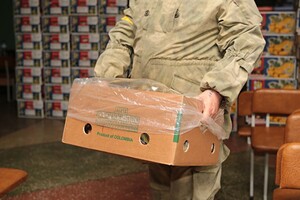Has the problem with “eggs priced at 17 hryvnias each” been solved? The first results of the law on transparent procurement
On April 23, defense customers began publishing information about non-armed purchases in the Prozorro system.
Since the beginning of the war, such information has been kept secret as according to the Ministry of Defense, its disclosure threatened national security. Until in January of this year, when after the investigation of Yuriy Nikolov, a scandal broke out with golden “eggs for 17 hryvnias”, which were purchased by Reznikov’s department. As a result, the anti-corruption committee of the Verkhovna Rada, in cooperation with the Anti-Corruption Action Center and other partners, have achieved the adoption of a law disclosing part of the information on non-armed purchases, namely, unit prices.
As of May 8, more than 10,000 reports have been published. We are going to conduct an in-depth analysis of these data after June 22, when the military will be required by law to report on all purchases from February 24, 2022.
However, the first conclusions can already be drawn. They are important to improve the control of the procurement by the public and international partners.
What conclusions can already now be drawn from the published purchases?
1. Data on published purchases will certainly not help the Russians and will not harm the Ukrainians.
For example, the first information from the military was a report on the purchase of a fecal pump for UAH 3,695.
Then everything went even more prosaic: food products, spare parts, EcoFlow power stations, etc. Even board games and guitars for soldiers because our soldiers definitely deserve a break.
It is not clear how this data will help the enemy. Even if we consider only the reports of the Ministry of Defense, it is hard to see the risks here as well. Most of them are currently related to textiles (uniforms, shoes, t-shirts, and hats) and fuel.
2. Some reports do not contain any specific data on the subject of procurement. This makes it difficult to understand whether the purchase price was inflated.
Most purchases in the system have a rather imprecise name. And if in the case of buying salt, sugar, and sausages this does not create any risks, then with a passenger car the matter is completely different.
For instance, the military unit T0710 of the State Special Service of Transport has bought a four-wheel drive vehicle for UAH 2.5 million. However, the purchase does not include any details about the car. Still, there is a difference when buying an all-wheel-drive pickup truck for the front line, for example, a Hilux, and a “parquet” jeep like a Range Rover Evoque.
The same military unit has bought watches at a price of up to UAH 19,700. It’s one thing to buy a fancy Luminox Original Navy Seal chronometer, which is among the top ten tactical watches in the world according to Gear patrol. And it’s a completely different matter when they buy an Apple Watch.
Military unit A0515 of the Main Directorate of Intelligence has bought certain watches worth from 5 to 9 thousand UAH. Here, certain letters and numbers are added to the watch names, but they do not help to identify the exact model.
It is not a frequent case, but it happens that military customers do not decipher the item of purchase at all. For example, military unit T0950 reported on the purchase of one package of “pharmaceutical products” for UAH 99,947.
It is almost impossible to verify the cost of purchasing high-top boots, purchased by the State Security Administration of Ukraine for UAH 1.8 thousand and by the Ministry of Defense for UAH 2.3 thousand. And meanwhile, one can state that the purchase of ZEPHYR GTX MID TF tactical boots for UAH 5.3 thousand while their minimum retail price is UAH 6.6 thousand is definitely a real success.
3. Fighting units report better than the rearguards.
The primary purpose of the Non-Arms Procurement Transparency Act is to ensure reporting by large government customers. These are the Ministry of Defense, the Ministry of Internal Affairs, the Security Service of Ukraine, and others.
However, it turns out that hundreds of reports are being uploaded to Prozzoro from individual military units with a lot of combat missions. Still, some customers with huge purchasing departments are in no hurry to report. For example, after President Volodymyr Zelenskyi signed the law on March 21, the Security Service of Ukraine began announcing new tenders at Prozorro and published only a little over forty reports. On the other hand, the truly exemplary Defence Intelligence unit A1225, which purchases products at the most favorable prices, already has more than 450 published purchases — ten times more.
Does the law solve the problem with “eggs for UAH 17” and “apples at UAH 51”?
The law on the publication of information on non-arms procurement and the rapid development of a corresponding tool in Prozorro is only the first step in solving the problem of inflated prices for food for the Armed Forces.
The system helps identify signs of other similar violations, if they occurred during the war, and prevent them in the future. However, to put an end to this scandal, of course, this is not enough. There are two more important tasks for our state.
First, those guilty of wartime corruption must be punished.
After the scandal, the authorities arranged a ridiculous inspection with the participation of the State Bureau of Investigation. As a result, the Pechersk Court ordered the former Deputy Minister of Defense Vyacheslav Shapovalov to take a precautionary measure, sending him to the pre-trial detention center. However, the State Bureau of Investigation is investigating Shapovalov not for corruption, but for “obstructing the legitimate activities of the Armed Forces of Ukraine and other military formations.” Although the content of the official reports of the State Bureau of Investigation refers specifically to claims for the purchase of low-quality goods and overpayments for them.
In fact, such atypical qualification of corruption may indicate the intention not to investigate, but rather, to intercept the initiative and potential evidence from the specialized law enforcement body, namely the National Anti-Corruption Bureau. Such schemes are used in practice to obstruct real investigation and results. So, it is quite likely that Shapovalov’s case is just another infoglut designed to appease indignant mood music and save the latter from the National Anti-Corruption Bureau.
After all, even before the public exposure of this story, the National Anti-Corruption Bureau and the Specialized Anti-Corruption Prosecutor’s Office began to investigate purchases for the army. However, thorough investigations can last more than one month, and these terms currently seem justified. It is important for the law enforcement officers to gather hard evidence before the case is heard in court, and this will definitely take time.
Secondly, procurement systems at the Ministry of Defense have not been changed.
At the meeting of the anti-corruption committee of the Verkhovna Rada on May 2, the head of National Anti-Corruption Bureau detectives Andriy Kaluzhynskyi confirmed that the source of the problems was the very scheme of purchasing food for the Ministry of Defense. In particular, it is about the actual concealment of the purchase of products under the guise of “services”. At the same time, the services themselves are not actually provided, and food is ordered from a catalog with 409 items. The head of detectives noted that only a third of the products in the entire catalog were actually delivered. These are just the most popular products: potatoes, eggs, carrots, etc. It is their value in the contracts that is significantly inflated. At the same time, the cost of products that are not actually delivered is much lower than the market price. As a result, the low price of foods that are not ordered allows the prices of popular products to be inflated.
Today, the Ministry of Defense has created a Change Support Office, which will take care of the issue of changing the procurement system. The people who joined the Office already have experience in implementing such reforms. However, the starting point here should be the creation and operation of a service agency that will carry out these purchases. As long as the agency has not started working, and people who have confidence and experience in implementing reforms do not have positions and powers, promises of change remain only words.
We at the Anti-Corruption Action Center wrote about this back in February. A similar message from the Minister of Defense was heard only a few weeks ago. Now the most important thing is that the words of the minister do not diverge from the deeds, as it has already happened.
After all, all the top foreign media wrote about the problems with the procurement of food for the Armed Forces. Including The New York Times and The Economist, which end up on the Oval Office desk and 10 Downing Street.
And now both these media and readers from offices in the countries that today provide us with weapons and finance more than 60% of the Ukrainian budget, expect explanations and real changes from us.
Read this article on russian and Ukrainian.
Please select it with the mouse and press Ctrl+Enter or Submit a bug


















 Login with Google
Login with Google